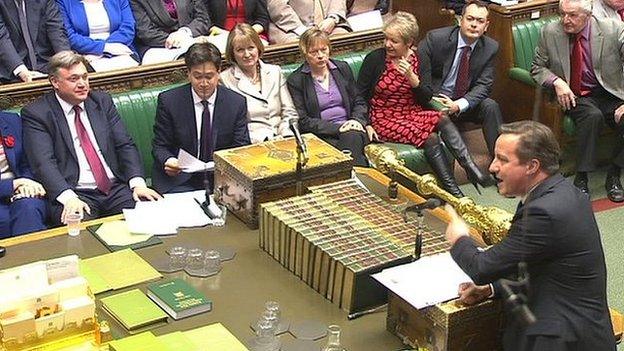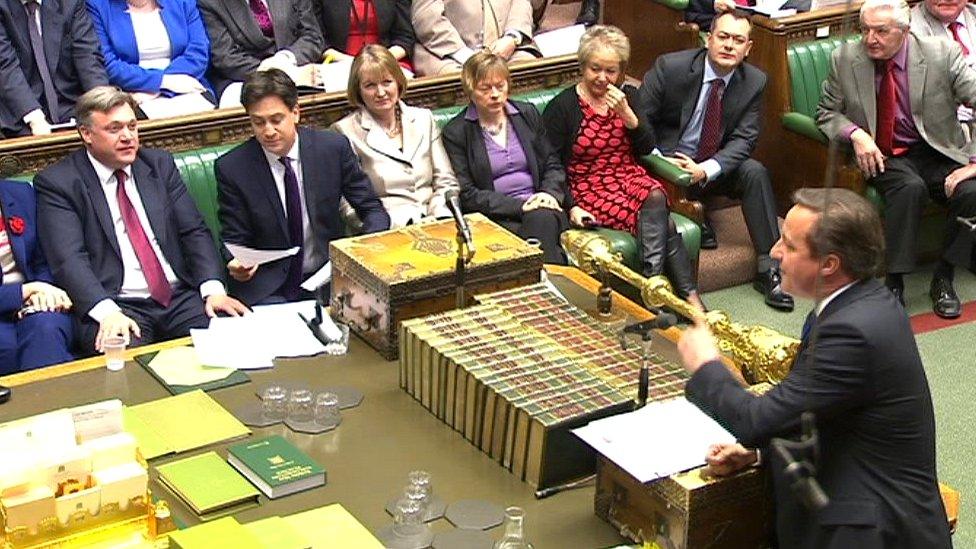'Dunce v Muppets' at Prime Minister's Questions
- Published
Claims of Muppets and dunces are aired at PMQs as Ed Miliband and David Cameron clash over the Royal Mail sale
David Cameron and Ed Miliband have been hurling insults at each other in a return of the "Punch and Judy" politics both men said they wanted to abolish.
In exchanges on the price of Royal Mail shares, Mr Miliband said the PM was "not so much the 'Wolf of Wall Street' as the 'dunce of Downing Street'".
The PM said he would not take lectures from the Labour leader and Ed Balls.
He branded the pair "the two Muppets" who had advised former PM Gordon Brown on the sale of the UK's gold.
Asked later if the word "Muppets" was the kind of language the prime minister should be using in Parliament, his spokesman said: "PMQs is a unique parliamentary occasion. It has been the way it has been for many years."
The exchanges came in one of most heated Prime Minister's Questions for some time, with Mr Miliband particularly fired up about the part-privatisation of Royal Mail, saying shares had been sold off far too cheaply.
'Mate's rates'
The National Audit Office has said the shares were priced too cheaply and the taxpayers did not get "value for money".
The Labour leader challenged Mr Cameron to name today's share price compared with the initial sale offering of 330p and condemned the government for getting a bad deal.
He claimed the shares had been "flogged off" at "mate's rates" to Mr Cameron's "friends in the City".
He claimed there was a "gentleman's agreement" among long-term investors that they would not sell their shares but, he added: "Half of them were sold and hundreds of millions of pounds were made."
Mr Cameron hit back at the Labour leader, saying: "I will take a lecture from almost anyone in the country about the sale of Royal Mail, but not from the two Muppets who advised the last chancellor on selling the gold.
"There they sit, there they sit, not a word of apology for £9bn wasted. The Royal Mail privatisation has got £2bn for the taxpayer."
The prime minister claimed that plans to sell off Royal Mail were in Labour's 2010 general election manifesto.

It later transpired that the pledge was not in Labour's manifesto, which was written by Ed Miliband.
Challenged about this, a Number 10 source said: "The year before, in 2009, Lord Mandelson unveiled plans to sell 30% of the Royal Mail."
Gordon Brown - who employed Ed Miliband and Ed Balls as advisers during his years as chancellor - is often accused by opponents of selling off Britain's gold reserves far too cheaply.
He decided to dispose of almost 400 tonnes of gold between 1999 and 2002 - the majority of Britain's reserves - for between $256 and $296 an ounce, only to watch it soar up to $1,615 per ounce.
Commons speaker John Bercow vowed recently to end the "yobbery and public school twittishness" at Prime Minister's Questions.
Mr Miliband was said to have sought to bring in a less confrontational PMQs style earlier this year and David Cameron said on his arrival as Conservative leader in 2005 that he wanted to end "Punch and Judy" politics.
Despite their efforts the sessions have continued to revert to form, with insults being exchanged and a bear pit atmosphere. It continues to be the single most watched political event of the week.
Shadow business secretary Chuka Umunna has written to Vince Cable to ask for more clarity on the reported "gentleman's agreement" with 16 priority investors not to sell-off the shares for a quick profit.
He asked the business secretary to publish all correspondence between the government and the investors and how many shares in Royal Mail they still hold.
- Published2 April 2014
